- Home
- Jennifer Donnelly
The Tea Rose Page 13
The Tea Rose Read online
Page 13
“Maybe you ’aven’t given ’im the right signs, miss.”
“I’ve given him every sign I can think of. He must be blind.”
“If you ask me,” Olive said, picking up pieces of glass, “it’s not the lad who’s blind.”
Millie sat up. “What do you mean by that?”
“Well… ’e works for your father, doesn’t ’e?”
“So?”
“It’s not right, miss, is it? It’s not proper to chase after your employer’s daughter. Try and see it from ’is angle. ’E probably thinks your father would be angry. Probably thinks ’e ’as someone better than ’imself picked out for you.”
Millie looked at Olive in amazement. She was right. It wasn’t that Joe wasn’t interested in her, of course it wasn’t. It was that he thought he wasn’t good enough for her! She was an heiress; she could have anyone, so why would she pick a penniless coster? It was all so clear now. Joe admired her father and looked up to him and it was out of respect for him that he’d never forced his attentions on her. How could she have been so stupid?
“Olive, you clever girl! That’s it exactly!” She plumped herself down at her vanity. She needed time with Joe and the right opportunity. Had he found her untouchable? Well, she would show him just how touchable she was. Oh, how she would! Men had powerful, uncontrollable urges. They simply couldn’t help themselves. That’s what her aunt told her when she’d started to bleed and they’d had their talk. “I’ve got to be bolder, Olive,” she said, regarding herself in the mirror. “Show him I’m his for the asking.” She bit her lip. “If only I could get him alone without Harry or Dad hovering.”
“What about Guy Fawkes night, miss?”
Every autumn Millie’s father held a huge Guy Fawkes party for his employees and customers. It was only about a month and a half away. As always, there would be an enormous bonfire, piles of food, and rivers of drink. Joe would come to the party; he’d have to. And in the dark, amid all the frolicking and fireworks, she would get him alone. She’d ask him if he wanted to see the house or some such thing. He’d have plenty of liquor in him by then and fewer inhibitions. Some men needed a push; she’d give him one.
Guy Fawkes night was eagerly anticipated by all who worked for Tommy Peterson. It was the night he handed out bonuses. Most companies did it at Christmas, but he was too busy with holiday business to spare the time then. It was also the night he gave out promotions. Joe was in line for one even though he was only newly hired. Millie knew this from suppertime conversations with her father. He spoke constantly of Joe’s talent and ambition. He noted how the Covent Garden business was already making gains as a result of his ability. Millie guessed he saw a lot of himself in Joe. She couldn’t say the same for Harry; he’d been there for three months and still wasn’t making much progress, poor dear. She knew his heart wasn’t in it, and little by little, her father was discovering that, too. He’d had great hopes for Harry, but those hopes were now being transferred to Joe. Although she hadn’t discussed it with her father, she knew that were Joe to come to him with a proposal of marriage one day, he would be delighted. Joe was fast becoming the son her father had always wanted.
“Olive, has my dress for the party come yet?”
“Yes, miss, it’s in your closet. It’s ever so pretty.”
Millie asked her to get it. She inspected it, frowning. It was a royal-blue taffeta with cap sleeves and a full skirt. It was pretty, but pretty wasn’t good enough. She needed something stunning. She wouldn’t go to her dressmaker, she’d go to Knightsbridge for something truly spectacular. It would cost, but with any luck, by the time the bill came her father would be too delighted with the news of her engagement to scold her.
“Are you still cleaning up that perfume? Go downstairs and tell Harris I’ll need the carriage first thing tomorrow. I’m going shopping.”
“Shopping? For what, miss?”
“Well, for a new perfume bottle, for one thing,” she said. “And a dress. A very special dress.”
“Another dress? What’s the occasion, miss?”
“With any luck, Olive, my engagement.”
Chapter 9
From where she stood, near the window in the parlor, Fiona could hear the rustle of dead leaves being swept along the street by a forceful wind. She drew the curtains against the encroaching night, shivering at the thought of the solitary figure who had made the darkness his own.
The Whitechapel Murderer had a new name now. He’d written a letter to the police exulting in the carnage he’d wreaked. It had been published in all the papers. He’d saved blood from one of his victims to write with, he’d explained, but it had gone hard in the bottle, so he’d had to use red ink. He’d signed it, “Yours truly, Jack the Ripper.”
Bloody ghoul, Fiona thought. She wasn’t allowed to sit on the step with her friends past dark anymore or go to the river by herself. Her evenings were spent inside now and she didn’t like it one bit. Kneeling down by the settee, she reached underneath it and pulled out a cigar box. In it were a few sheets of paper and two envelopes she’d bought to write to Joe and her Uncle Michael. She returned to the kitchen. A fire was blazing in the hearth; her whole family was there except her father, who was working.
Curran, the foreman at Oliver’s, had asked him to fill in for the night watchman, who was sick with influenza. Fiona missed him being home in his usual spot by the fire, but she’d see him in the morning. She’d hear him come in. She liked the sound of him coming home, his approaching steps on the cobblestones, his whistling. It made her feel safe and secure.
She got a pen and a bottle of ink from the cupboard and sat down at the table. Her mother was in her rocker darning. Charlie sat in his father’s chair, reading a book he’d borrowed from Mr. Dolan, next door, on America. Normally he would’ve been out with the lads, but with both his father and Roddy gone, he’d stayed home to keep his mother company and make sure Jack didn’t slide down the chimney and murder them all. Seamie was playing with his soldiers. Eileen was in her basket.
Fiona thought for a minute about what she would write to Joe. There wasn’t much to report. Not much had happened on Montague Street in the few days since she’d last seen him. The biggest news was their courtship. She remembered that night with a smile. Her mother had been all misty-eyed, delighted that Fiona would have such a good, hardworking lad for a husband, happy that she would have her heart’s desire, her childhood sweetheart. No mother could wish for more, she’d said. If all her children made such good matches, she would count herself lucky.
Her da, however, had been a different matter. When she’d come in bursting to show off her ring and tell her news, he’d sat in his chair looking gruff and saying nothing. After Joe left, he let it be known that seventeen was far too young for any lass of his to be getting married. And he hoped she had a long courtship in mind, because to his thinking, nineteen was the youngest a girl should marry. Her mother had put a finger to her lips, warning her not to start. Later, when he went out to the pub, she reassured Fiona that he’d come around, that he was not quite ready to lose his girl yet. “Give him a little time to get used to the idea,” she’d said. And for once, Fiona followed her mother’s advice. She hadn’t argued, knowing if she did, he’d suddenly decide thirty was the right age to marry. The next day he invited Joe for a pint. She didn’t know what transpired, but he was in a cheerful mood when he got back. The following day, he’d revised nineteen to eighteen.
Was this the way you handled men? she wondered. Nod, agree, tell them what they wanted to hear, then go about your business just as you’d planned? It was how her mother handled her da. She put her pen to paper and started telling Joe all about her father’s change of heart.
“Who you writing to, Fee?” Charlie asked.
“Joe and then Uncle Michael.”
“Let me write a page to Uncle Michael when you’re done, would you?”
“Mmm-hmm,” she said, bent over her paper, writing carefully so the pen didn’t
blot.
“Wish they lived ’ere, your aunt and uncle,” Kate sighed. “Especially now that they’re expecting. ’E’ll be your cousin. Or she. ’E’s a lovely man, your father’s brother. A bit of a devil, as I recall. Though maybe ’e’s settled ’imself down by now –”
Her words were cut off by a frantic battering on the door.
“Blimey!” Charlie exclaimed, jumping to his feet.
“Missus! Missus!” a man’s voice shouted. “Open up!”
“Stay put, Mam,” Charlie said, moving off down the hallway. Within seconds, he was back in the kitchen with a policeman in tow.
“Mrs. Finnegan?” the officer asked breathlessly. “I’m P. C. Collins …”
“Aye?” Kate said, standing.
“Can you come quickly, ma’am … it’s your ’usband …”
“My God! What is it?”
“ ’E’s ’ad an accident down the docks. They’ve taken ’im to ’ospital. Can you come along right quick?”
“What ’appened?” Fiona cried. Her pen clattered to the table, splashing ink on her letter. An ugly blot spread across the page.
“ ’E fell, miss. From a loop’ole …” the bobby said.
She held his gaze, waiting for him to finish. Oliver’s was a tall building, six stories high. It could’ve been the first story. Oh, please God, she prayed, let it be the first story.
The bobby looked away. “From the fifth story.”
“Noooo …” Kate shrieked, covering her face with her hands. Fiona ran to her mother, catching her as she sank to the floor.
The officer looked at Charlie. “Please, son … there isn’t much time …”
Charlie snapped into action. “Mam … Mam!” he barked. “Get your shawl on. Fee, get Eileen wrapped up. Come ’ere, Seamie …” As he put Seamie’s boots on, Fiona knotted their mother’s shawl around her shoulders. She picked up Eileen, tucked a blanket around her, snuffed the lamps, and banked the fire. Officer Collins led Kate outside. Charlie ran to the Bristows. Within minutes, Mr. Bristow was in his shed at the bottom of the street harnessing his horse.
The noise and commotion brought several of the neighbors out. Anne Dolan came running over. “Fiona, what is it? What’s ’appened?” she asked.
“Me da’s ’ad an accident. We’ve … we’ve got to get to ’ospital…”
“ ’Ere,” Mrs. Dolan said, reaching into her skirt pocket, “ ’ere’s money for an ’ackney cab.”
“Thank you, Mrs. Dolan, but Mr. Bristow’s bringing ’is cart round.”
They heard the sound of clopping hooves from the end of the street and then Peter Bristow was at their door. Rose Bristow had come outside and was trying to comfort Kate. “Climb up next to Peter, luv, ’urry,” she said. “I’ll come right after. Soon as I can get the kids seen to. It’ll be all right. Your Paddy’s a tough old bugger.”
P. C. Collins helped Kate up, then he piled onto the back of the cart with Fiona, Charlie, and the little ones.
“Giddyap!” Mr. Bristow barked, snapping the reins sharply. The cart lurched forward. As they trotted along through the dark streets, Fiona, cradling a whimpering Eileen, looked at Charlie, who held a frightened Seamie in his lap. She didn’t dare speak her thoughts aloud, for fear of further upsetting their mother, but her eyes told her brother that she was terrified. She heard Mr. Bristow urging his horse on, heard him talking to Kate, and then she heard traffic and saw more streetlights, and knew they were near the Whitechapel Road. Her thoughts raced. How could her father have fallen? He knew Oliver’s like the back of his hand. Only fools or drunks fell. Maybe he landed on a pile of sacking or coils of rope, something to break his fall. Maybe it wasn’t as bad as the constable said. She started to pray again, feverishly, to Jesus, the Virgin Mary, Saint Joseph, Saint Francis, any saint she could think of, to please, please help her da.
The cart finally pulled up in front of the hospital. Charlie was out of it before it stopped. P. C. Collins swung Seamie down. Fiona jumped down with Eileen in her arms. Kate was up the steps immediately. Mr. Bristow shouted that he’d be in as soon as he secured the cart. Inside, one of the two sisters who staffed the front desk stopped them and asked Kate which patient she was here to see.
“Paddy Finnegan. ’E’s me ’usband. ’E ’ad an accident…” Her voice caught.
“Finnegan …” the sister repeated, running a finger down her roster. She looked up at Kate. “The one from the docks?”
“Aye,” Charlie answered.
“First floor. Top of those stairs and turn left. There’s a man up there already. A constable. He said he was your lodger.”
Kate nodded and turned toward the stairs.
“Just a minute,” the second sister said officiously. “She can’t go up there with all those children. It’s a hospital ward …”
“Sister Agatha!” came the sharp reprimand. “Never mind, Mrs. Finnegan. Go, dear. Hurry!”
Kate ran to the stairs. Fiona followed, slowed down by the baby. She was closer to the sisters’ station than they thought and she could hear them even as she neared the staircase. “… at times we must bend the rules for reasons of compassion, Sister Agatha … this is the last chance those children have to see their father …”
“Oh, no … no!” Fiona sobbed, her voice echoing off the walls of the cavernous lobby. She handed Eileen to P. C. Collins, and then she was running, right behind her mother. They pushed the doors to the ward open together. A shattering sight greeted them.
Paddy lay in a bed near the front of the long, open room that was the men’s ward. His eyes were closed. He was mumbling, rolling his head from side to side. His breathing was shallow and labored and his face, drained of all color, was slick with sweat. As they drew near, a wave of pain gripped him. He writhed against it, pleading for it to stop. Fiona saw that his arms were scraped raw, and that there was nothing, absolutely nothing, where his right leg used to be.
Sitting next to his bed, in his blue uniform, was Roddy. He turned when he heard them approach. His face was wet with tears. “Oh, Kate …” he said.
Kate stumbled to the bed. “Paddy?” she whispered. “Paddy, can you ’ear me?”
He opened his eyes and looked at her, but didn’t know her. Another wave of pain slammed into him and this time he screamed, arching his back against it.
Unable to bear it, Fiona covered her ears. “ ’Elp me da,” she moaned. “Somebody please ’elp ’im.” Eileen, terrified, was shrieking in the constable’s arms. Seamie buried his head in Charlie’s legs. Seconds later, two sisters and a doctor were at her father’s bedside. While the sisters held him, the doctor injected a syringe of morphine into his arm. After what seemed like an eternity but was only seconds, his agony eased.
“Mrs. Finnegan?” the doctor, a tall, gray-haired man, asked.
“Aye …”
“I’m afraid I must tell you … your husband doesn’t have much longer. His legs were crushed in the fall. We were forced to amputate the right one immediately or he would have bled to death.” He paused. “He has other injuries as well and he’s hemorrhaging… bleeding inside. We’re trying to keep him out of pain, but he can’t take much more … I’m sorry.”
Kate covered her face with both hands and sobbed. Fiona went to her father’s bedside and took his hand. She was dizzy with shock. Her mind could not understand this. Hadn’t she just said good-bye to him on his way to work? Now he was in a hospital bed, his body broken. It can’t be, she thought, staring at his hand, so big against hers. It’s not possible …
“Fee …”
“Da! What is it?”
He swallowed. “Water.”
She snatched a jug of water from another patient’s night table. “Mam! Mam!” she shouted, pouring some into a glass. She supported her father’s head with one hand and held the glass to his lips with the other.
Kate was at his side in an instant. “Paddy?” she said, trying to smile through her tears. “Oh, God … Paddy …”
“Kate
…” he rasped, his chest heaving with the effort of talking. “Sit me up.” The wild, glassy look in his eyes had receded; he knew his family.
Slowly, gently, Kate and Fiona eased him forward, stopping when he cried out, and propped his pillow behind him. His breathing became frighteningly ragged; he closed his eyes for a few seconds until the hitching in his chest lessened. Marshaling his remaining resources, he drew his family around him.
He motioned for Eileen. P. C. Collins gave her to Kate, who set her gently down on the bed. He held her close in his damaged arms, kissed her hand and her forehead, then gave her back to Kate. Seamie, relieved to hear his father’s voice, went bounding toward him. Fiona grabbed his arm to slow him and told him in a faltering voice to be careful.
“Why?” he asked reproachfully, backing away.
“Because Da ’as a bad ’urt.”
“Where?”
“On ’is leg, Seamie.”
Seamie looked at the lower half of his father’s body. Sucking on his lower lip, he looked at Fiona, then said, “But Da’s leg is gone.”
Fiona, in shock, awkward, but tender with her baby brother, said, “One leg’s gone, Seamie, but the ’urt is on the other one.”
Seamie nodded. Then, soft as a mouse, he went to his father. He kissed his knee and patted it, his tiny fingers light and gentle. “All better, Da?” he asked.
“Aye, Seamie,” Paddy whispered, reaching for his son. He clutched the boy, kissed his cheek, and let him go.
He called for Charlie next and told him that he was the man of the house now and that he must take care of his mother and brother and sisters.
“No, Da, you’ll get better …”
Paddy shushed him, then asked him to go to his waistcoat, hanging on a chair at the foot of his bed, and get his watch. Charlie did so. Paddy told him it had once been his grandfather’s, now it was his. “You’re a good lad, Charlie. Take care of them. Look after them.”
Charlie nodded and turned away from the bed. His shoulders were shaking.

 Rogue Wave
Rogue Wave Waterfire Saga, Book One: Deep Blue (A Waterfire Saga Novel)
Waterfire Saga, Book One: Deep Blue (A Waterfire Saga Novel)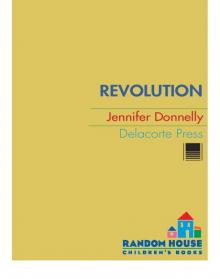 Revolution
Revolution The Wild Rose
The Wild Rose Waterfire Saga (4 Book Series)
Waterfire Saga (4 Book Series)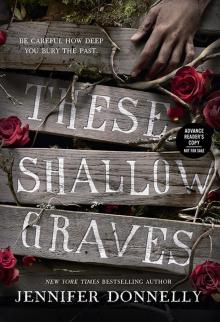 These Shallow Graves
These Shallow Graves Beauty and the Beast: Lost in a Book
Beauty and the Beast: Lost in a Book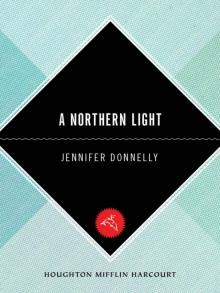 A Northern Light
A Northern Light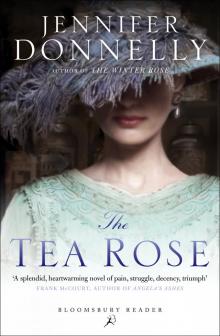 The Tea Rose
The Tea Rose Waterfire Saga, Book Three: Dark Tide: A Deep Blue Novel
Waterfire Saga, Book Three: Dark Tide: A Deep Blue Novel The Winter Rose
The Winter Rose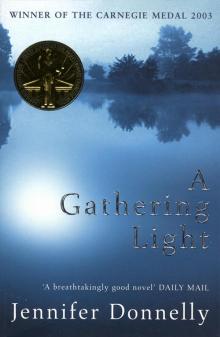 A Gathering Light
A Gathering Light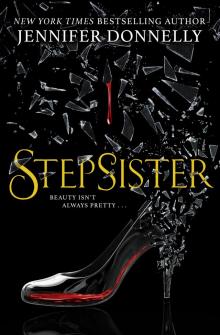 Stepsister
Stepsister Waterfire Saga, Book Four: Sea Spell: Deep Blue Novel, A
Waterfire Saga, Book Four: Sea Spell: Deep Blue Novel, A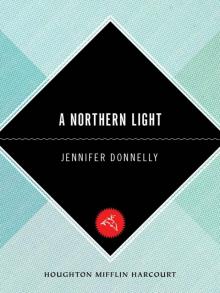 Northern Light
Northern Light Winter Rose, The
Winter Rose, The